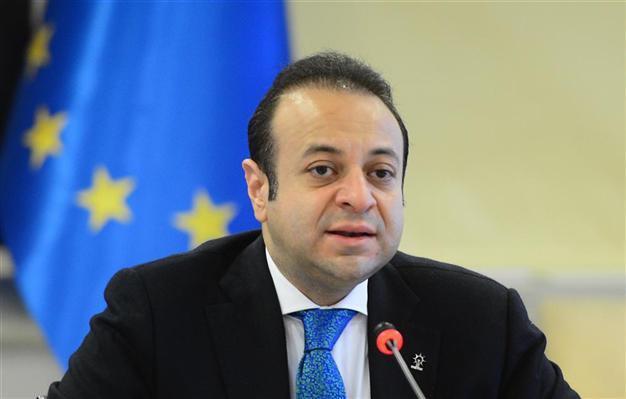Turkish gov’t seeks credit for deputy Balbay’s release
ANKARA

EU Minister Egemen Bağış has said that the release of Balbay was possible because of government-led reforms as part of Turkey’s bid for full EU membership. AA photo
A Cabinet member has sought to take credit for the release from prison of journalist and main opposition deputy Mustafa Balbay, underlining that the release was possible because of government-led reforms as part of Turkey’s bid for full EU membership.EU Minister Egemen Bağış, also the chief negotiator in Turkey’s membership negotiations, recalled that individual application to the Constitutional Court was part of a set of reforms that were voted on in the Sept. 12 referendum in 2010.
“This decision to release Balbay was made, thanks to the right of individual application to the Constitutional Court, which was part of that package,” Bağış was quoted as saying by Anadolu Agency on Dec. 10, referring to a regulation that went into force in September 2012.
Foreign Minister Ahmet Davutoğlu joined Bağış in arguing that Balbay’s release was actually a result of steps taken by the government for Turkey’s democratization.
“It is seen that the right to individual application to the Constitutional Court is a big reform,” Davutoğlu said in response to questions from reporters.
Main opposition Republican People’s Party (CHP) deputy Balbay was released late on Dec. 9, pending appeal, after the Constitutional Court ruled that his pre-trial detention period, which lasted over four years, had violated his rights.
While delivering an opening speech at a meeting of Parliament’s Financial Cooperation Coordination Board, Bağış extended his good wishes to Balbay, but also took the opportunity to criticize the CHP.
“This is a case that is still not finalized. Waiting for the result before commenting is a requirement in respect of the law. However, this is what I believe will be useful to underline: The party under the roof of which Balbay is doing politics and the extensions of this mentality have unfortunately resisted all of our government’s reforms and stood against every step taken for democratization,” Bağış said, expressing sadness over the prevalence of such a mentality.
Balbay was among 275 defendants, including an ex-military chief, retired officers, academics, journalists and opposition politicians, many of whom were given long imprisonment sentences in August over an alleged ultra-nationalist plot to overthrow Prime Minister Recep Tayyip Erdoğan’s government.
The Constitutional Court last week ruled that the four years and nine months Balbay spent in prison pending trial had violated his rights to freedom and representation as an elected parliamentarian.
Balbay denied any role in the “Ergenekon” conspiracy network, but was sentenced to almost 35 years in prison.
Defense lawyers have appealed the guilty verdicts in the marathon, five-year-long Ergenekon trial, but a final Constitutional Court decision is not expected until 2015.
















